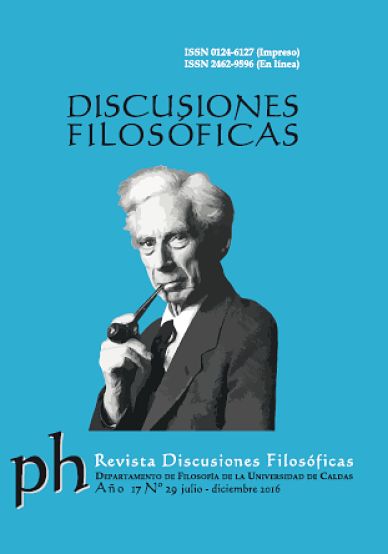Authors
Abstract
The aim of this article is to show the decisive influence of Friedrich Schelling's thought in Søren Kierkegaard's existential reflection. First, the historical context in which the German philosopher goes back to teaching and the impact that his lessons about Philosophie der Offenbarung produce in the young Kierkegaard, are described.Subsequently, the main theses contained in Schelling's Course and the appropriation, reinterpretation and development of them by Kierkegaard in his famous Begrebet Angest are examined. Finally, it is concluded that the infinite possibility of freedom and the distinction between essence and existence, fundamental Kierkegaardian principles, are Schelling's proposals that become a unique intuition in the Danish thinker.
Keywords
References
Colette, Jacques. “Kierkegaard et Schelling”. Kairos. 10 (1), 1997: 19-31. Print.
Cruz, Juan. Ontología de la razón en el último Schelling. Pamplona: Cuadernos de Anuario Filosófico, 1993. Print.
Duque, Felix. Historia de la filosofía moderna: la era de la crítica. Madrid: Akal, 1998. Print.
Fabro, Cornelio. Riflessioni sulla libertà. Segni: Edivi, 2004. Print.
Garrido, Ángel. “Un ancla en la nada. Interpretación de la lectura de M. Henry del concepto de angustia de S. Kierkegaard”. Daimon. Revista Internacional de Filosofía. 65 (2), 2015: 107-118. Print.
Goñi, Carlos. “Sócrates y Kierkegaard”. Espíritu. 123 (1), 2001: 75-99. Print.
Grøn, Arne. “El concepto de la angustia en la obra de Kierkegaard”. Thémata, Revista de Filosofía. 15 (3), 1995: 15-30. Print.
Hegel, Georg. Enzyklopädie der philosophischen Wissenschaften im Grundrisse. Frankfurt am Main: hg. E. Moldenhauer und K. Michel, 1979. Print.
Kant, Immanuel. Kritik der Reinen Vernunft. Stuttgart: hg. von Ingeborg Heidemman, 1995. Print.
___. Apuntes sobre la Filosofía de la Revelación. Madrid: Trotta, 2014. Print.
___. Begrebet Angest. København: Gads Forlag, 2012. Print.
___. Papirer. København: Gyldendal, 2011. Print.
Koktanek, Anton. Schellings Seinslehre und Kierkegaard. Munich: Oldenbourg, 1962. Print.
Pera, Salvatore. “L’influsso di Schelling nella formazione del giovane Kierkegaard”. Archivio di Filosofia 1 (1), 1976: 73-108. Print.
Pérez, Fernando; Francesc Torralba y Jacobo Zabalo. “Schelling y Kierkegaard: la génesis de la angustia kierkegaardiana”. S. Kierkegaard: apuntes sobre la Filosofía de la Revelación. Madrid: Trotta, 2014. Print.
Rumble, Vanessa. “The Oracle’s Ambiguity: Freedom and Original Sinn in Kierkegaard’s The Concept of Anxiety”. Soundings: An Interdisciplinary Journal. 75 (1), 1992: 605-625. Print.
Schelling, Friedrich. Philosophie der Offenbarung. Stuttgart: Sämtlichen Werke, hg. von K.F.A. Schelling, 1856-1861. Print.
___. Philosophische Untersuchungen über das Wesen der menschlichen Freiheit und die damit zusammenhängenden Gegenstände. Stuttgart: hg. von K.F.A. Schelling, 1856. Print.
Stewart, Jon. “The Notion of Actuality in Kierkegaard and Schelling’s Influence”. Ars Brevis. 17 (1), 2011: 237-253. Print.
Tilliette, Xavier. Schelling im Spiegel seiner Zeitgenossen. Turin: Bottega D’Erasmo, 1988. Print.
Torralba, Francesc. Poética de la libertad: lectura de Kierkegaard. Madrid: Caparrós Editores, 1998. Print.
Zelada, Manuel. “Verdad y subjetividad en el Postcriptum de S. Kierkegaard”. Estudios de Filosofía. 12 (1), 2014: 162-168. Print.

 pdf (Español (España))
pdf (Español (España))
 FLIP
FLIP




























